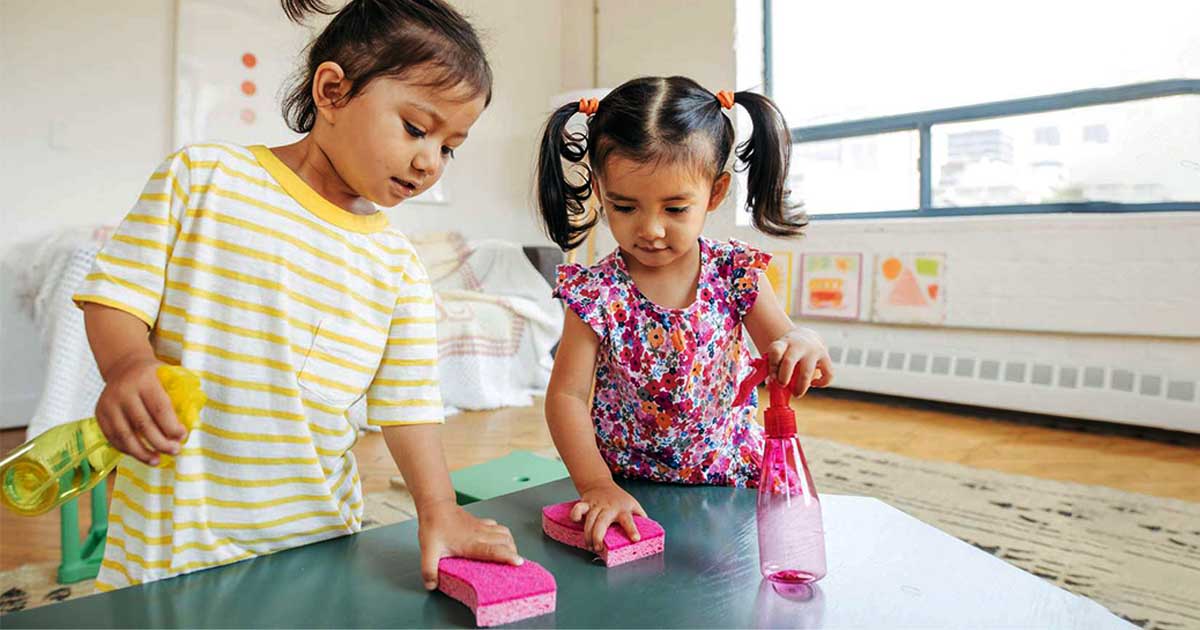Anxiety at school can present significant challenges for both children and parents alike. Whether it’s the fear of social interactions, academic pressures, or separation anxiety, navigating these emotions can be daunting.
Recognizing the complex nature of anxiety in the school environment is essential for learning how to deal with anxiety at school for teachers and parents alike!
In this article, we’ll explore various aspects of anxiety at school, including social anxiety, academic stress, and separation anxiety, and provide practical strategies for teachers and parents on how to help a child with separation anxiety at school.
What Causes Social Anxiety At School
Understanding the complex nature of social anxiety in children is crucial for providing adequate support and intervention. Various factors can contribute to the development and exacerbation of social anxiety at school settings.

1. Social Comparison:
Children often feel the need to compare themselves to others in terms of academic, social and physical performance. This constant comparison can make them feel inadequate and worsen their anxieties about socializing.
This anxiety is due to perceiving oneself as falling short of expected standards in sports, academics or appearance hence some children will avoid social gatherings.
2. Peer Rejection or Bullying:
Rejection or bullying from peers can profoundly influence a child’s self-worth and sense of belonging. A fear of being teased, laughed at or snubbed may escalate anxiety levels in children when they are in public places as it may lead to a negative experience that causes them to withdraw from other kids.
3. Academic Pressure:
Imposing high academic expectations on young people either by teachers, parents or oneself can be a source of significant stress for them. They may develop social anxiety if they find it hard to perform well among friends or authority figures thereby making classroom activities or group work terrifying for some learners.
4. Low Self-Esteem:
Children with low self-esteem may struggle with feelings of inadequacy and unworthiness in social settings. The lack of faith leads such individuals into becoming more prone to socially anxious moments where they are afraid that other people will judge and dismiss them based on their actions.
It is important then that self-esteem be built up and a positive sense of self nurtured so as to help young people who have this type of problems.
5. Perfectionism:
Social anxiety disorder in children can be driven by an unrelenting pursuit for perfectionism. Their thinking paralysis when they come across situations involving others, worrying continually about how the rest would perceive them if any form associated imperfections stood out.
These factors once addressed along with provision of appropriate support will nurture confident resilient children who can navigate through the twists and turns within society.
Through appropriate strategies we shall create an atmosphere which promotes positive learning and development for all children in that they can thrive socially and academically.
Read More: Is Homeschooling Better For Mental Health? 5 Strong Reasons
How To Deal With Anxiety At School
Addressing anxiety in the school environment is a crucial aspect of supporting students’ overall well-being and academic success. Teachers play a pivotal role in creating a nurturing and inclusive atmosphere where students feel safe, valued, and empowered to learn.

Here are ten practical tips for how to deal with anxiety at school for teachers and parents:
1. Encourage Safety and Supportiveness:
Teachers are key in ensuring a classroom that is accommodating and friendly to all students. Trusting each other with oneself and feelings will be the foundation for healthy communication and emotional well-being. Cultivate a sense of respect and acceptance among students so that they can freely express their emotions without fear of censure.
2. Educate Yourself on Anxiety Disorders:
Teachers need to know about anxiety disorders so that they can help students who have them. Teachers need to take time in learning the different types, symptoms, and behavioral manifestations of anxiety disorders in class.
You are then able to recognize anxiety’s warning signs better as well as address how it should be handled at school.
3. Mind the Triggers:
One thing to remember while trying to understand how deal with anxiety at school is being careful about triggers within classrooms.
The identification of possible triggers for anxiety among learners in a classroom helps create an environment conducive to studies. Examples of common stimuli include stage fright, group work, or unexpected changes in routines within the learning environment.
Consequently, through mindfulness, such causes could be identified by teachers who would take timely actions by providing necessary adjustments necessary for effective control of learner’s anxieties.
4. Develop Self-Care Habits:
Learners need training on how they can manage their worries hence this part focuses on self-calming techniques such as meditation, positive thinking or even breathing deeply.
These include engaging in regular physical exercises, having enough rest through sleep as well eating appropriate diets which may keep emotions stable while reducing stress levels at some points in life when very anxious moments last long than usual (Mayo clinic staff 2018).
5. Allow Flexible Learning Paths:
Understand that every student has his own way of learning and therefore needs different modifications that will make him excel academically; flexibility in terms assignments and exams is necessary towards helping the students who suffer from anxiety.
Provide other avenues for students to show mastery of content, like written assignments, or projects and presentation that enable them to show what they know in their own time and way.
6. Promote Growth Mindsets:
Embrace growth mindset by focusing on effort, progress as well as resilience rather than perfection. Teach children how to flip negative thoughts into positive ones and see failure as a learning opportunity.
On the other hand, creating an environment where errors are viewed as part of the learning process would encourage students to take risk and be more challenged.
7. Create Supportive Peer Networks:
Let learners have a chance to talk with each other and ensure that they feel supported in the classroom itself! Make sure that you create a sense of belonging by promoting collaboration, empathy and helping among them. On top of this, it is important that students look out for their peers whenever they are in need of support which will always promote inclusiveness and kindness in schools
8. Establish your Expectations:
Outline expected student behaviors, academic achievement levels along with class room participation. By doing so, teacher ensures predictability with structured routine while providing visual cues thereby reducing uncertainty among anxious teachers and for that reason promotes confidence among students.
9. Provide Individual Attention:
It is important to touch base with individual pupils during lessons as necessary (Hamilton & Hamilton 2004). Create an atmosphere where learners can express themselves including issues without having any fear of being punished simply because one is studying under restricted environment created by their own tutor for instance who may not be ready enough in handling anxious individuals or groups.
Developing solid teacher-student relationships is crucial when it comes to specific learners needing extra help because they are suffering from anxiety disorder.
10. Interact with Assistance Offered:
Formulate personalized blueprints for students with anxiety disorders in collaboration with school counselors, psychologists and other support staff. Work together on methods and interventions that could help them socially, emotionally and academically.
This would make the teachers ensure complete assistance is provided to learners so that their individual issues are addressed through working with guidance services.
By implementing these strategies on how to deal with anxiety at school, teachers can foster a supportive and inclusive learning environment where students feel understood, supported, and empowered to overcome their anxiety.
Through collaboration, compassion, and a commitment to understanding the unique needs of each student, educators can make a significant difference in helping students thrive both academically and emotionally.
Read More: Child Sleep Requirements: A Comprehensive Guide For Parents!
How To Help A Child With Separation Anxiety At School
Separation anxiety can be a challenging experience for both children and parents, especially when it comes to starting school.

The following are some of the ways on how to help a child with separation anxiety at school:
1. Gradual Separation Practice:
Start by gradually exposing your child to short periods of separation in familiar environments, such as leaving them with a trusted caregiver or family member for brief intervals. This practice helps them learn that separations are temporary and that you will return.
2. Establish a Consistent Routine:
Create a predictable daily routine that includes specific rituals for drop-off and pick-up times. Consistency provides a sense of security and helps your child feel more confident and in control of their environment.
3. Stay Positive and Reassuring:
Maintain a positive attitude and reassure your child that school is a safe and welcoming place. Use positive language when discussing school and emphasize the exciting opportunities for learning and making new friends.
4. Encourage Independence:
Encourage your child to develop independence by allowing them to participate in age-appropriate tasks, such as packing their backpack or choosing their school supplies. Empowering them to take ownership of their school experience can boost their confidence and reduce anxiety.
5. Provide Comfort Objects:
Allow your child to bring a comfort object from home, such as a favorite toy or a family photo, to school. Having a familiar item nearby can provide comfort and reassurance during times of separation.
By implementing these strategies and offering consistent support and reassurance, parents can help their child navigate separation anxiety and thrive in the school environment.
Remember to be patient and understanding, as every child’s experience with separation anxiety is unique. With time, patience, and a supportive approach, children can overcome their anxiety and develop the confidence they need to succeed in school.
Read More: How to Help Your Child Make Friends: 10 Effective Tips For Parents!
A Word From Mind Family
As a family, navigating the challenges of anxiety at school requires patience, understanding, and a collaborative approach.
By implementing the strategies outlined above and fostering a supportive environment at home, you can empower your child to overcome their anxiety and thrive in the school setting.
Remember to provide consistent reassurance, maintain open communication, and seek support from teachers and school counselors when needed. Together, we can help our children develop the resilience and confidence they need to succeed academically, socially, and emotionally.
With love, understanding, and support, we can navigate through the journey of separation anxiety and help our children flourish in their educational endeavors.
Frequently Asked Questions (FAQs)
1. What causes social anxiety at school?
Social anxiety at school can stem from various factors like peer pressure, bullying, academic stress, and low self-esteem, leading to fear of judgment and social interactions.
2. How to deal with anxiety at school?
Strategies for how to deal with anxiety at school include creating a safe environment, educating oneself about anxiety disorders, practicing mindfulness, offering flexible learning options, and fostering peer support.
3. How to help a child with separation anxiety at school?
By learning how to help a child with separation anxiety at school, parents can practice gradual separation, establish routines, provide reassurance, encourage independence, and offer comfort objects for support during separations.











